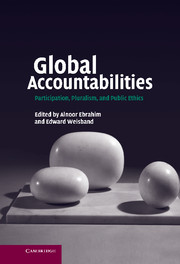Book contents
- Frontmatter
- Contents
- List of tables
- List of figures
- Acknowledgments
- List of contributors
- 1 Introduction: forging global accountabilities
- Part I Public accountability: participatory spheres from global to local
- Part II Experiments in forging NGO accountability: mutuality and context
- 5 Multiparty social action and mutual accountability
- 6 Not accountable to anyone? Collective action and the role of NGOs in the campaign to ban “blood diamonds”
- 7 Bringing in society, culture, and politics: values and accountability in a Bangladeshi NGO
- Part III Reflective accountability: new directions for participatory practices
- Part IV Global accountability frameworks and corporate social responsibility
- Index
- References
6 - Not accountable to anyone? Collective action and the role of NGOs in the campaign to ban “blood diamonds”
Published online by Cambridge University Press: 22 September 2009
- Frontmatter
- Contents
- List of tables
- List of figures
- Acknowledgments
- List of contributors
- 1 Introduction: forging global accountabilities
- Part I Public accountability: participatory spheres from global to local
- Part II Experiments in forging NGO accountability: mutuality and context
- 5 Multiparty social action and mutual accountability
- 6 Not accountable to anyone? Collective action and the role of NGOs in the campaign to ban “blood diamonds”
- 7 Bringing in society, culture, and politics: values and accountability in a Bangladeshi NGO
- Part III Reflective accountability: new directions for participatory practices
- Part IV Global accountability frameworks and corporate social responsibility
- Index
- References
Summary
This chapter examines the NGO campaign on “conflict diamonds,” sometimes known as “blood diamonds.” It reviews efforts by a handful of self-appointed NGOs to press governments into the creation of an international regulatory system for the sale and purchase of rough diamonds, and it looks at NGO activities which aimed to force the world's entire diamond industry to change the way it has done business for more than a hundred years. This is not an objective, academic review of the subject. In 1995 I wrote a book about NGOs entitled The Alms Bazaar (Smillie, 1995). I subsequently worked on the diamond campaign myself for several years, seeing it from the inside, and from the beginning. I have worked with one of the pioneering NGOs on conflict diamonds – Partnership Africa Canada (PAC). I also worked for a UN Security Council Expert Panel, tracking the connection between diamonds and weapons in Sierra Leone's horrific civil war, and I have been an active participant in the Kimberley Process, a series of meetings that began in 2000 in an effort to deal with the problem. I therefore bring a variety of personal perspectives to bear on the story, and on the question of NGO accountability.
The contribution of this chapter to the broader themes of this book is thus more empirical than theoretical.
- Type
- Chapter
- Information
- Global AccountabilitiesParticipation, Pluralism, and Public Ethics, pp. 112 - 130Publisher: Cambridge University PressPrint publication year: 2007
References
- 2
- Cited by

